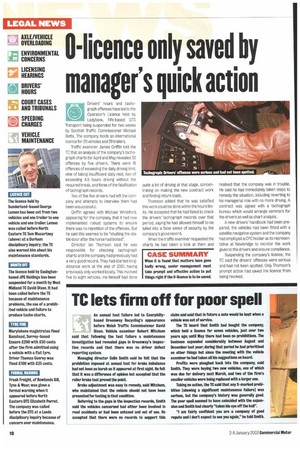0-licence only saved by manager's quick action
Page 10

If you've noticed an error in this article please click here to report it so we can fix it.
Drivers' hours and tachograph offences have led to the Operator's Licence held by Ladybank, Fife-based GTS Transport being suspended for two weeks by Scottish Traffic Commissioner Michael Betts. The company holds an international licence for 20 vehicles and 29 trailers.
Traffic examiner James Griffin told the TC that an analysis of the company's tachograph charts for April and May revealed 30 offences by five drivers. There were 16 offences of exceeding the daily driving limit, nine of taking insufficient daily rest, two of exceeding 4.5 hours driving without the required break, and three of the falsification of tachograph records.
Two of the five drivers had left the company and attempts to interview them had been unsuccessful.
Griffin agreed with Michael Whiteford, appearing for the company, that it had now implemented robust systems to ensure there was no repetition of the offences. But he said this seemed to be "shutting the stable door after the horse had bolted".
Director Ian Thomson said he was responsible for checking tachograph charts and the company had previously had a very good record. They had started longdistance work at the end of 2001, having previously only worked locally. This involved five to eight vehicles. He himself had done quite a lot of driving at that stage, concentrating on making the new contract work and finding return loads.
Thomson added that he was satisfied this work could be done within the hours limas. He accepted that he had failed to check the drivers' tachograph records over that period, saying he had allowed himself to be lulled into a false sense of security by the company's good record.
When the traffic examiner requested the charts he had taken a look at them and realised that the company was in trouble. He said he had immediately taken steps to remedy the situation, including reverting to his managerial role with no more driving. A contract was signed with a tachograph bureau which would arrange seminars for the drivers as well as chart analysis.
A new drivers' handbook had been prepared, the vehicles had been fitted with a satellite navigation system and the company had employed a CPC holder as its representative at Newbridge to monitor the work given to the drivers and ensure compliance.
Suspending the company's licence, the TC said the drivers' offences were serious and had not been spotted. Only Thomson's prompt action had saved the licence from being revoked.
































































































































